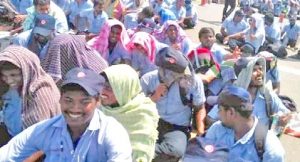Mobilize a New “Army of Hungry Masses”

Autoworkers on strike in Chennai, India, 2018
INDIA, January 22— “My name is Amit Kumar. I am 38 years old. I have been a contract worker at the Ford factory for the last 12 years. My wife and four children live in a small village about 1600 km from here. Eight workers like me occupy my small room. Our work is very irregular. Next month if we don’t pay rent, we will be out in the street. I saw a copy of Red Flag. I am here to talk to you.”
Comrades from our ICWP auto workers collective visited Amit. He lives about 10 km from us. As in other working-class colonies, we had to negotiate small lanes full of rotting garbage, dirty puddles full of mosquitos, raw sewage. There are five toilets for hundreds of residents.
Altogether, this colony has 28,000 workers, all related to the auto industry. Even the smallest car cannot drive here. This colony is one of several organized by the kind of work people perform daily.
“Since covid, our work has become highly irregular. And now, we are just one step from being homeless,” Amit told us. “If I get paid, I make Rs 14000 ($190) a month. My rent is Rs 2000 and the remaining money goes for my children’s school. As you can see, there is very little food. When we don’t get paid, we eat every other day some chapati (tortilla) with chili and salt. The hot chili makes us drink water, so we don’t feel hungry.”
The party comrades had brought homemade food. Another worker who lives with Amit was there. He has been reading Red Flag that Amit shares in his room. Perhaps the other six guys are also familiar with Red Flag. Our mood changed as we talked about Red Flag.
“When people are desperate, looking for something to eat next day and the only way they get it is by working, they feel demoralized,” said Amit. “But I am not alone. There are 28,000 workers like me. All over India, there are hundreds of millions. We are facing unemployment, young people have no jobs, petrol and gas prices are rising every day and cannot catch up with the inflation.
“After reading Red Flag,” Amit continued, “I realized that the capitalist bosses have created tremendous ways to keep us disunited. They have created hatred between Hindu and Muslim workers. All these TV channels spread this lie 24 hours a day. There is talk of getting rid of the Muslims by ethnic cleansing. While people are thinking of genocide, they are not going to think about poverty and unemployment.”
We had a very long conversation about how capitalist bosses maximize profit by dividing the workers based on caste, religion, and gender. The maximization of profit is at the root of capitalism. We can only end it by eliminating the bosses: this is communism. Communism will also end money because the working class will get what it needs, not based on the profit motive of our class enemy.
Amit and his coworkers are interested in attending our next meeting. But they are still not convinced about how their hunger and their urgent need to meet the rent money connects to our communist cause. This led to another very long conversation about the role of the old communist party in India in the 1940s.
As world war raged, Indian workers were forced to serve British imperialism. Imperialism created an artificial famine in Bengal when the rice that used to feed the local population disappeared to be sold for more profit abroad.
The Bengal famine of 1943 killed 3 million out of 60 million people there. The Communist Party organized a hugely popular ‘army of hungry masses’ that brought tens of thousands to the streets of Kolkata. However, their demands were reformist. They asked for land reforms to give more land to landless workers. In the city, the industrial workers demanded higher salaries.
And today 25 lakh (2.5 million) Indians starve to death every year. Landless rural workers are the largest part of the population.
Our party has a clear vision: communist revolution to end this capitalist system that survives by offering reforms to bribe one group against another by caste and gender. Last week we saw 8000 Foxconn women workers striking against the bosses. Some of our workers were there to show support by spreading Red Flag.
We can make bigger strides by creating communist leaders among Dalits, Muslims, women, and other industrial workers. What Amit and his friend told us is the story of millions of workers. When we listen to their stories, their aspirations, their obstacles, the working class is giving us the clue to fighting for communism. It is our job to recruit them to ICWP.

